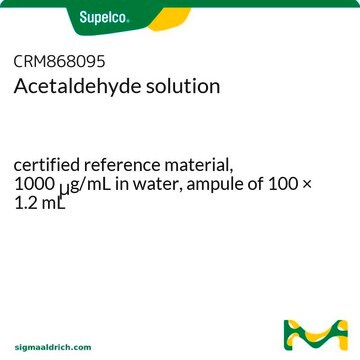719099
Acetaldehyd -Lösung
5 M in THF
About This Item
Empfohlene Produkte
Form
liquid
Konzentration
5 M in THF
Brechungsindex
n20/D 1.389
Dichte
0.868 g/mL at 20 °C
0.843 g/mL at 25 °C
Lagertemp.
2-8°C
SMILES String
[H]C(C)=O
InChI
1S/C2H4O/c1-2-3/h2H,1H3
InChIKey
IKHGUXGNUITLKF-UHFFFAOYSA-N
Suchen Sie nach ähnlichen Produkten? Aufrufen Leitfaden zum Produktvergleich
Verwandte Kategorien
Signalwort
Danger
Gefahreneinstufungen
Carc. 1B - Eye Irrit. 2 - Flam. Liq. 2 - Muta. 2 - STOT SE 3
Zielorgane
Central nervous system, Respiratory system
Zusätzliche Gefahrenhinweise
Lagerklassenschlüssel
3 - Flammable liquids
WGK
WGK 3
Flammpunkt (°F)
-25.1 °F - closed cup
Flammpunkt (°C)
-31.7 °C - closed cup
Analysenzertifikate (COA)
Suchen Sie nach Analysenzertifikate (COA), indem Sie die Lot-/Chargennummer des Produkts eingeben. Lot- und Chargennummern sind auf dem Produktetikett hinter den Wörtern ‘Lot’ oder ‘Batch’ (Lot oder Charge) zu finden.
Besitzen Sie dieses Produkt bereits?
In der Dokumentenbibliothek finden Sie die Dokumentation zu den Produkten, die Sie kürzlich erworben haben.
Kunden haben sich ebenfalls angesehen
Unser Team von Wissenschaftlern verfügt über Erfahrung in allen Forschungsbereichen einschließlich Life Science, Materialwissenschaften, chemischer Synthese, Chromatographie, Analytik und vielen mehr..
Setzen Sie sich mit dem technischen Dienst in Verbindung.






